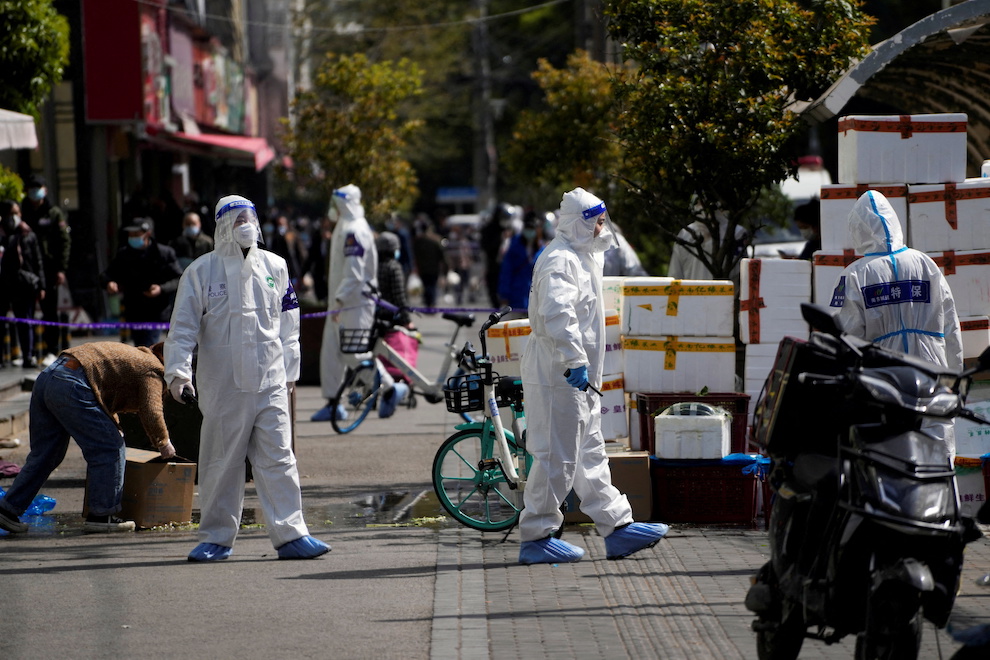The heavy price that Shanghai is paying in economic terms for its prolonged Covid lockdown has started to show in initial figures revealed on Saturday by local officials.
China’s biggest city, with a population of about 25 million, has suffered a severe slump in both industrial output and retail sales.
Shanghai’s statistics bureau said on Saturday the year got off to a positive start but the city was hammered by the Covid outbreak that emerged in early March and led to officials declaring a lockdown of the entire city in early April when case numbers surged.
The city’s gross domestic product grew 3.1% in the first quarter, but that was well down on the 4.8% in national GDP growth over the same period and less than half its first-quarter expansion in 2021.
“In January-February, the city’s economic operation was stable, but due to the impact of the Covid outbreak in March, the first quarter was marked by stability followed by a decline,” the city’s statistics bureau said in a statement.
Output from its huge industrial sector plunged 7.5% year-on-year in March after stringent lockdowns halted some production, a city official said on Friday.
But for January-March, industrial production still grew 4.8% from a year earlier, data on Saturday data showed.
However, Shanghai’s first-quarter retail sales – a key gauge of consumption – fell 3.8% year-on-year, swinging from 3.7% growth in the first two months.
And in March, retail sales plummeted by 18.9%.
In the first quarter, the city’s consumer prices rose 1.8% from a year earlier, with prices in January-February up 1.6% year-on-year and accelerating in March to 2.2%.
Higher consumer inflation came as Shanghai residents complained about food and basic supplies during the lockdown, with some saying prices of vegetables had gone up by five to 10 times of levels before the outbreak.
Job creation also slowed, with Shanghai reporting 192,600 new jobs in the first quarter, a drop of 26,200 from the year-earlier quarter.
Figures for April and the second quarter are expected to be much more severe.
Barriers Erected At Victims Homes
Meanwhile, authorities in Shanghai have erected mesh barriers outside some residential buildings, sparking a fresh public outcry over the lockdown that has forced most city residents to stay home.
Images of workers in white hazmat suits sealing entrances of housing blocks and even closing entire streets with roughly two metre-tall green fencing went viral on social media on Saturday, prompting questions and complaints from residents.
“This is so disrespectful of the rights of the people inside, using metal barriers to enclose them like domestic animals,” one user on social media platform Weibo said.
One video showed residents shouting at workers setting up fencing from their balconies, who later relented and took them away. Other videos showed people trying to pull the fences down.
Most of the barriers appeared to have been erected around compounds designated as “sealed areas”, which are buildings where at least one person has tested positive for Covid-19. It means that those residents are forbidden from leaving their front door.
It was not immediately clear what prompted authorities to resort to barriers, but a notice dated Saturday from one local authority shared online said it was imposing “hard quarantine” on some areas.
Transfers to Isolation Centres
Officials are saying the Covid outbreak in Shanghai is the country’s biggest-ever effort to test, trace and force all positive cases into central quarantine facilities.
The lockdown – over three weeks long for many residents – has fuelled frustration over access to food and medical care, lost wages, family separation, conditions in quarantine, and censorship of efforts to vent online.
Factory production has been badly disrupted by snarled supply chains and difficulties faced by locked-down residents returning to work.
The city is carrying out daily citywide Covid testing and accelerating transfers of positive cases to central isolation facilities to eradicate virus transmission outside quarantine areas.
In the past week, authorities have been transferring entire communities, including uninfected people, to isolation facilities outside Shanghai, saying they wanted to disinfect their homes, according to residents and social media posts.
39 Deaths on Saturday
The city reported 39 new Covid deaths for April 23, versus 12 the previous day and by far the most during the current outbreak.
During the first few weeks, no deaths were reported, but this appeared to fuel doubt among residents about the figures. It has since reported 87 fatalities, all in the past seven days.
Shanghai recorded 19,657 new locally transmitted asymptomatic cases, versus 20,634 a day earlier, and 1,401 symptomatic, versus 2,736.
Cases outside quarantined areas totalled 280 from 218 on the previous day.
China largely succeeded in keeping Covid at bay following the initial outbreak in Wuhan in late 2019, with a “dynamic zero” policy aimed at stamping out chains of infection.
That approach has been challenged by the spread of the highly infectious but less deadly Omicron variant, which has prompted cities to impose various levels of restrictions on movement.
Nationwide, China reported 20,285 new asymptomatic coronavirus cases for Saturday, versus 21,423 a day earlier, with 1,580 symptomatic cases, versus 2,988.
Beijing recorded 22 new cases – all locally transmitted – compared to six the day before, prompting a number of gyms and after-school activity providers to suspend in-person classes.
•Reuters with additional editing by Jim Pollard
ALSO on AF:
Xi Jinping Sticks With Tough Covid Stance Despite Public Anger
























